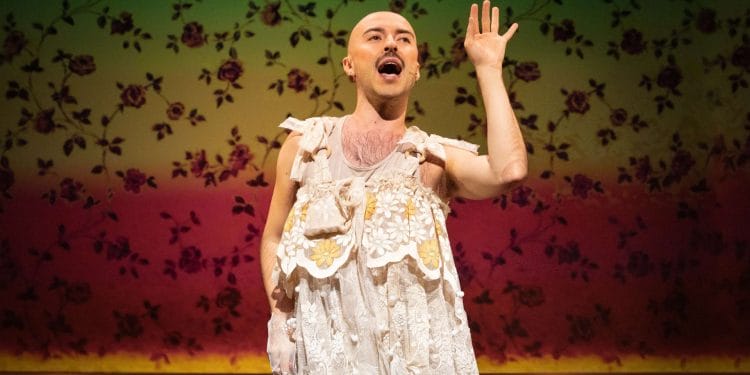Written and performed by Rob Madge, the critically acclaimed production of My Son’s a Queer, (But what can you do?) will transfer to the Ambassadors Theatre in London’s West End.
Celebrating the joy and chaos of raising a queer child, My Son’s a Queer, (But what can you do?), over the past two years, has debuted to a critically acclaimed and sold-out season at the Turbine Theatre, followed by another sell out run at the 2022 Edinburgh Festival Fringe, and, to the delight of fans, transferred to the Garrick Theatre in October and November this year.
The production opens at Ambassador’s Theatre on 27 January, with previews from 25 January, and runs until 18 March. Tickets are on sale here.
My Son’s A Queer (But What Can You Do)? is heading back to the West End, what can you tell us about the show?
When I was 12, I put on a Disney parade in my hall for my Grandma. My Dad was my Stage Manager, navigating bubble guns for Ariel, floats for Mickey Mouse and missing cues for Mary Poppins. Now I’m 26 I figure the sensible thing to do is recreate this parade. In order to do that, I’ll have to wade through the archives of my home video collection – research purposes, you see. That’s the bare bones of it at least.
What inspired you to write this show?
I was sharing some of these home videos online. Mostly because I thought they were hysterical. Many of the comments, however, focused on the unwavering support of my family, drawing attention to how my Dad wore wigs and let his son wear dresses, something that “not many Dads would do”. I was startled that something so normal in my life could be seen as something so extraordinary for those that weren’t as fortunate. So, I thought it would be a good idea to celebrate my family in a show and perhaps pose the question as to why all families can’t be so supportive. It’s only a wig!
The show has had phenomenal success, why do you think audiences have identified with it so much?
At its heart, it shares happiness. We don’t see enough of that. It’s almost punk rock to be happy. We’ve lost our joy as a society and hopefully the show serves as a reminder that we can recapture it. We all have our inner child that needs a bit of nurturing and I hope the show helps people on their way with that.
It also makes simple issues that have been complicated. If we boil it all down to childhood and ask the question “why would you not support your child?”, it exposes the reality that we are all just human beings, having a laugh, throwing on wigs and dresses. And why would you not support that? Why would you not support joy? It makes it very easy to accept queer identities, even makes those that perhaps struggled look a bit silly for not accepting it in the first place. That simplicity is much missed in life and much needed and I think that’s why it resonates. Just have a laugh!
It’s clearly a very personal story to tell, what do you enjoy, and find most challenging, about performing this show?
Hearing my family get applause nightly fills me with pride. I feel a sense of vindication: “Yes! They are brilliant. I knew I was right”. That, I enjoy a lot. It’s a double-edged sword though. I put great pressure on myself to make sure the story translates and that, although personal on surface-level, it ends up being universal. If families leave the show not having seen themselves reflected in mine, I have failed as a storyteller.
So, although it’s personal insofar as it’s my family onscreen, the story I’m telling is one for a much wider community. I think the very nature of its specificity is what allows people to relate. It’s our story.
Has anything about the show changed for this new run?
We’ve gone through many versions of this show but it’s always evolving in tiny ways, mostly dependent on the crowd. I love playing around with that relationship between performer and audience. At its heart the story remains the same, but we always work hard to keep it fresh.
What would you say to anyone thinking of booking to see My Son’s A Queer (But What Can You Do)?
Stop thinking please and get yourself a ticket. I guarantee you’ll laugh out loud and leave the auditorium a little brighter. Ultimately, it’s a story of hope. We need a bit of that right now.

















Comments 1